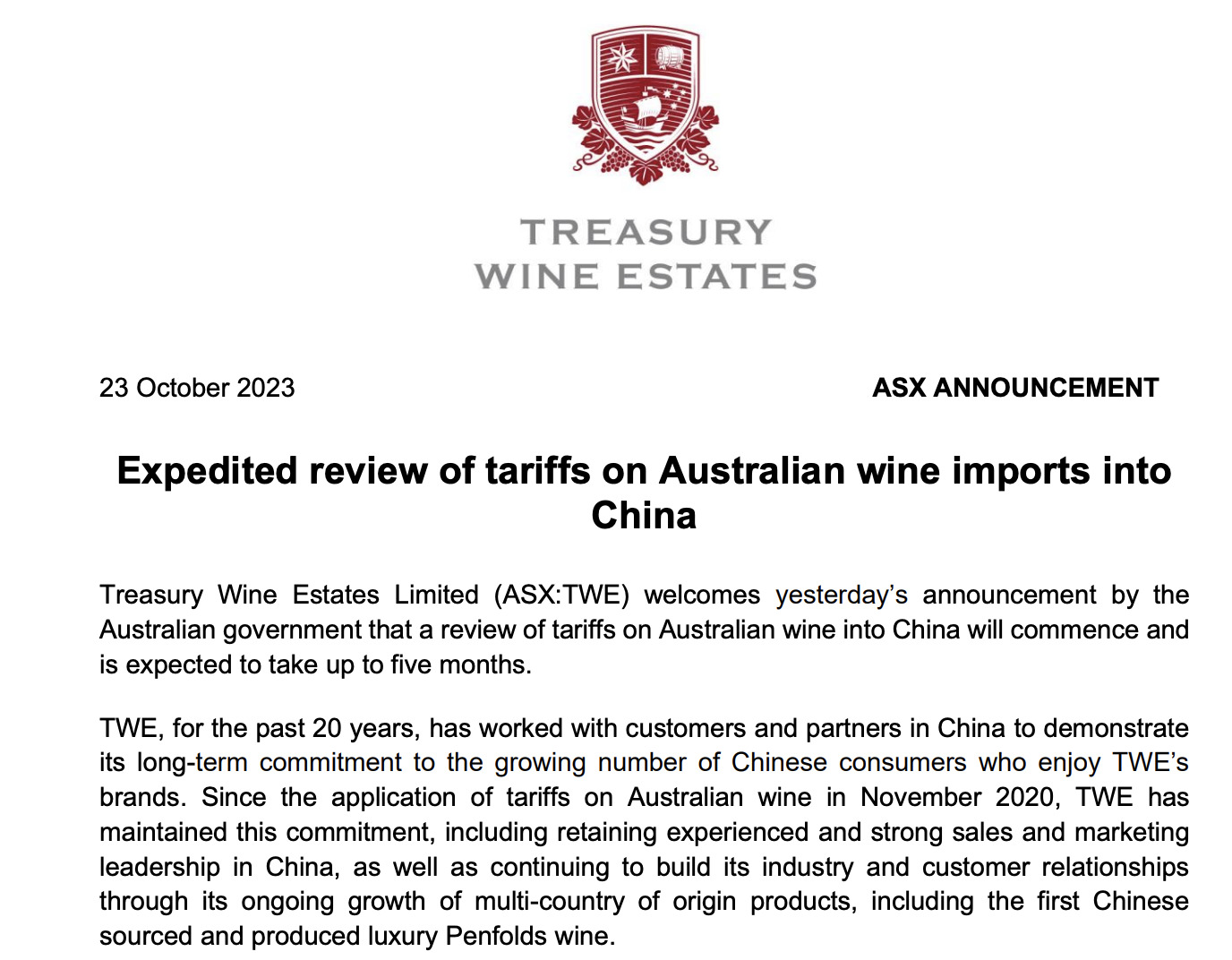Bottom’s up for TWE? The whining could be over as Albo aims to be toast of Beijing

Via Getty
Prime Minister Anthony Albanese has confirmed plans to visit Beijing next month to meet Chinese President Xi Jinping, a day after China has given its first indication it’s in the mood to ‘suspend tariffs’ on Australian wine.
Forget last night Albo, we’re going to China!
I welcome the progress we have made to return Australian products, including Australian wine, to the Chinese market.
On 4 November, I will travel to China.
This will be another step to stabilise relations between Australia and China, in the interests of both our countries. pic.twitter.com/koL3SEWP70
— Anthony Albanese (@AlboMP) October 22, 2023
TWE closed up +5% mid last week after the first comments Chinese wine tariffs could get sorted – at circa 220% – representing a circa $1.2bn pat on the back and a desperately needed cash injection to our China-less wine sector.

TWE CEO Tim Ford on Monday:
“It’s great to see an agreement for an expedited pathway forward to allow our Australian brands and wine to be sold in the Chinese market. There are only positives to come out of a favourable review for the Chinese consumer, customers and the wine category, for the Australian wine industry and for TWE.
Both governments have worked constructively to achieve this outcome and we now look forward to a new era of positive engagement that ultimately will build a strong and growing China wine category should the review see the removal of these tariffs.”
The punitive trade hit thwacked upon TWE et al, actually forced a fab reinvention of the business to a diversified high-end exporting business which has resulted in some beaut and significant sales into the US.
Treasury Wine Estates (ASX:TWE)

In FY23, sales were split between Treasury America at ~34%, Penfolds at ~34%, and Treasury Premium Brands at ~32%.
An uncertain amount of treasure
According to Market Matters, if China reopens the TWE mark-up will largely depend on the detail, but the incremental upside “could easily see the stock test its 2023 high, around 20% higher.”
“We don’t believe that TWE has the potential upside from a reopening of the Chinese market built into its share price – TWE must believe it’s a possibility as they “stockpile” wines in anticipation &/or hope.”
Anna Milne, senior investment analyst at Wilson’s, says TWE is the largest listed premium wine seller globally and has been a long-term holding in WAM’s Leaders investment portfolio.
“There has been positive news flow on the China and Australia trade relationship, including the Chinese Ministry of Commerce releasing a statement around its willingness to work with Australia to resolve the current wine tariff matters, recent removals of tariffs on Australian barley and hay, as well as Australia being added as a preferred tourist destination.
“Treasury Wine Estates continues to be a key holding in the investment portfolio, as we see the eventual removal of China’s wine tariff to drive a share price re-rating, along with a potential earnings upgrade cycle.
“We also believe the company is well placed to capitalise on the strong luxury and premium wine industry trends, which have proven resilient against a softening macroeconomic backdrop.”
Anna says she believes TWE’s strong balance sheet position provides the company with further optionality for capital returns or acquisitions.
Lots to talk about in November
The visit early next month comes after Albo said on Saturday that a deal has been made with China’s powers to at least ‘review its wine tariffs over the next months and move forward’ to solve the dispute which now resides with the other powers that be inside the World Trade Organization (WTO).
Albanese will arrive in China on November 4.
He’ll meet President Xi Jinping and Premier Li Qiang in Beijing and then go fly the flag at the China International Import Expo in Shanghai, before heading home on November 7.
Yeah, that’s a fairly notable breakthrough in a relationship that plumbed some fascinating depths over the past number of years.
The word is China will take five months to get around to reviewing the tariffs it slapped on Australian plonk.
Australia has agreed to suspend action in the World Trade Organization as a result.
A productive discussion today with China’s Premier Li Qiang.
We exchanged views on bilateral issues, including trade, consular and human rights matters. Australia welcomes ongoing progress in the stabilisation of our bilateral relationship with China. pic.twitter.com/5V67zJYnyi
— Anthony Albanese (@AlboMP) September 7, 2023
Albanese said the review marked ‘a turning point’ in the trade relationship and he was hopeful the review would lead to the tariffs being dropped.
“We’re very confident that this will result in, once again, Australian wine, a great product, being able to go to China, free of the tariffs which have been imposed by China,” comma fan Albo said.
The Chinese Ministry of Commerce confirmed on Sunday that Beijing had reached an agreement with Canberra on a “proper resolution” of trade disputes over wine and wind towers, after similar announcements were made by Australia.
“China and Australia are important trading partners to each other, and China is willing to continue through dialogue and negotiation, working together to advance the stable and healthy development of our bilateral economic and trade relationship,” the ministry said in a statement.
The other bloke can’t come
Albo’s will be the first visit by an Australian leader to China since 2016.
Ties went off a cliff in 2020 after the administration of Albanese’s predecessor Scott Morrison joined other world leaders in urging an international probe into the origin of the coronavirus.
China responded by imposing an import tariff of 80.5% on Australian barley in May 2020, and then pinged a maximum 218.4% on wine.
Trade in key Aussie commodities like coal and seafood were also targeted.
In an encouraging description of Australia’s new potential in the eyes of Beijing, the state-run South China Morning Post has been told by an international affairs professor at Chengdu’s Sichuan University, that ‘Canberra was seeking a “new type of relationship” with China.’
“Australia, sandwiched between China and the West, is actively exploring a new type of relationship with China, as the relationship between China and the United States remains uncertain and filled with challenges,” professor Pang Zhongying, told the SCMP, highlighting US-China rows over the COVID-19 pandemic and the Ukraine war.
“Given that Sino-US relations remain difficult with no fundamental breakthroughs in sight, it is important for China to maintain a friendly relationship with major neighbours, including Australia,” Pang told the SCMP.
Given its close trade ties with both top global economies, Australia could potentially act as a bridge in multilateral diplomatic relations, Pang added.
That description is exactly the one Albo’s people would be encouraging the Labor leader to strive for.
Related Topics
UNLOCK INSIGHTS
Discover the untold stories of emerging ASX stocks.
Daily news and expert analysis, it's free to subscribe.
By proceeding, you confirm you understand that we handle personal information in accordance with our Privacy Policy.








